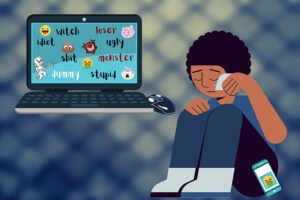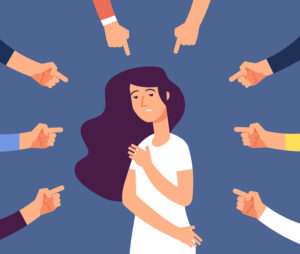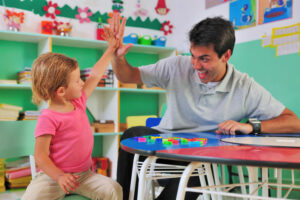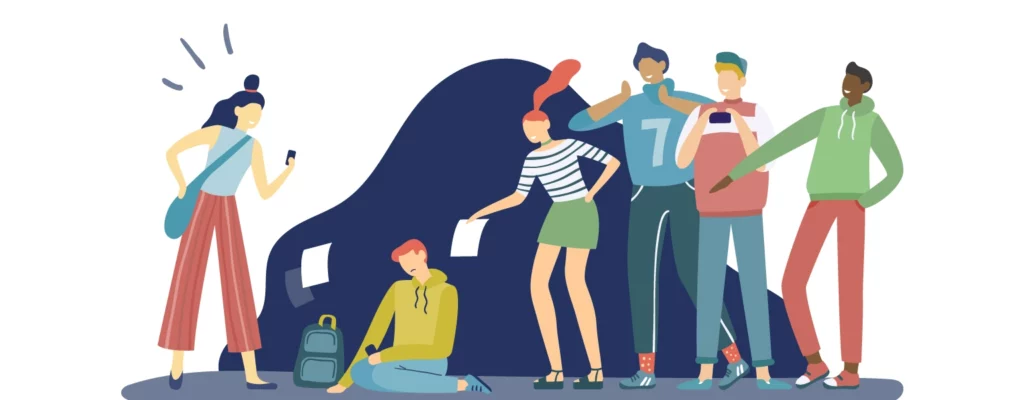Bullying is a big problem in schools these days. It can be really hard to deal with, and it often leaves kids feeling alone, scared, and helpless. In this blog post, we will provide you with a know-it-all guide to bullying. We will talk about what bullying is, the different types of bullying, how to deal with bullies, and more!
Contents
What Is Bullying?

Bullying is unwanted, aggressive behavior among school-aged children that involves a power imbalance. The behavior can be repeated over time. In addition to aggression, it is also an act of power.
Types Of Bullying
Bullying can take various forms. While some may be evident and common, some can be tricky and hard to spot.
Verbal Bullying
A way of insulting, demeaning, or belittling the victim through the use of degrading words/statements or name-calling. It is the most common type of bullying.
Physical Bullying

Use of physical attacks such as kicking, slapping, punching, shoving, or hitting the victim. Physical bullies are often stronger and bigger, which further gives them power over their peers. It can also include stealing or damaging personal belongings.
Social Bullying
Also known as relational bullying, it is an underrecognized form of bullying which involves manipulation through social sabotage. Some common examples are spreading rumors, practicing social exclusion, emotional infidelity and intentionally embarrassing somebody in public.
Cyberbullying

A way of using technology to bully someone is by sending mean/threatening messages or emails, posting hurtful comments on social media sites, or engaging in other online activities that may harm the victim. Moreover, it can happen 24/7 and often anonymously.
Sexual Bullying
Consists of sexually targeting a victim through inappropriate touching, crude name-calling, making vulgar comments about one’s body as well as non-consensual sexting.
Why Does Bullying Happen?
There is no one specific reason why kids bully others. Some likely and commonly observed reasons can be:
Having low self-esteem

It is undoubtedly said that people who bully others are compensating for their lack of self-esteem by bringing down others. Kids with low confidence may compensate for it by making others feel the same.
Exposure to violence/abuse
Children particularly coming from abusive homes can be bullies. Seeing their primary caregivers indulge in physical/mental/verbal abuse, children may start picking up on these behaviors and project them onto their peers. They may also channel their suppressed aggression through such measures.
Peer pressure

Sometimes kids go against their morals and correspondingly indulge in bullying just to fit in their social groups. This is done to avoid facing the fear of exclusion or becoming a potential target. They may also do so to prove themselves as superior and strong to their peers.
Gaining power and popularity
In some cases, it can be seen as a power play by regaining control and making others fearful of the bully. Similarly, popular kids might bully their inferiors to look ‘cool’ and threaten others with their level of control and power.
They were once victims
In the case of kids who have been bullied in the past, they may start bullying others in rage. They might do it out of a sense of karma or payback for their past ordeals.
Who Is An Easy Target For Bullies?

- Shy, introverted kids. Bullies can take advantage of their quiet nature.
- Those with less or no friends at all make for an easy victim. Loners are cornered first as they do not have anybody for their backup or support.
- Kids who are seen as ‘abnormal’ by the majority. These can be children with a physical/mental/learning disability, social/ethnic minorities, LGBTQ+ individuals, or additionally, those who don’t fit the social norms of being physically attractive.
How To Deal With Bullies?
Although it can feel difficult, there are various ways by which bullying and its effects can be dealt with.
Develop healthy coping mechanisms.
Indulge in an activity that calms you and diverts your mind. Activities such as sports, art, reading, cooking, volunteering, etc. can be done.
Be assertive.

If your bully verbally mocks you, find a way to talk back. This will hence send out the message that you are not as weak as they had made you out to be.
Learn self-defense.
If your bully tends to get physical/sexual, it is necessary to protect yourself from such attacks. In that case, learn some martial arts/taekwondo moves to prevent mishaps.
Know your rights.
Identify helplines, legal authorities, relevant committees/cells who deal with these complaints and reach out to them in the event of facing any difficulties.
Utilize your support system.
Talk to your social support, such as friends, family, or peers, and let them know you need help. Understand that one shouldn’t feel guilty for asking for support or care.
Teachers, counselors, and school administration are available for moral support and legal protection in such situations.
Remind yourself of your worth
Lastly, remember that the bully’s actions may not have anything to do with you or your self-worth, it might just be a projection of theirs.
Effects Of Bullying
Bullying has severe side effects. These can further prove to be dangerous if not looked after.

- Psychiatric illnesses like depression and anxiety
- Low self-esteem
- Increased stress levels; lead to physiological problems like digestion issues or migraines
- Trust issues
- Untreated trauma can also cause PTSD
- Sleeping/Eating disorders
- Increased aggression, leading to anger issues and temper tantrums
- Social isolation; difficulty in maintaining relationships
- Increased conflicts at home
- Self-harm/suicidal tendencies may rise
- Poor academic/co-curricular performance (which can further manifest as poor work performance in adulthood)
- Increased vulnerability to substance addiction or abuse
Prevention Of Bullying
Adults can play an important role in preventing bullying. This further involves parents, legal guardians, teachers, administration, and counselors.

- At home, the parent or guardian can initiate open conversations around bullying.
- It is important to build a support system wherein the child feels safe, heard, trusted, and subsequently, open up if facing any issues.
- Additionally, concepts of consent, boundaries, empathy, and confrontation can be taught.
 4. Furthermore, schools can organize various campaigns and interactive programs. This altogether reassures children that they have safe and trusted support even outside the home.
4. Furthermore, schools can organize various campaigns and interactive programs. This altogether reassures children that they have safe and trusted support even outside the home.
5. Similarly, regular parent-teacher interaction can ensure transparent communication about the child’s well-being.
6. Moreover, students having an increased sense of empathy and understanding can help in having reliable peer support and standing up against interpersonal disparities.
Conclusion
It is thus important to understand that bullying is a serious issue and its effects can be long-lasting. However, there are many resources available to help the victims. Furthermore, with the additional support of adults and the community, we can further reduce instances of bullying.
A Word From Therapy Mantra
Your mental health — Your psychological, emotional, and social well-being — has an impact on every aspect of your life. Positive mental health essentially allows you to effectively deal with life’s everyday challenges.
At TherapyMantra, we have a team of therapists who provide affordable online therapy to assist you with issues such as depression, anxiety, stress, workplace Issues, addiction, relationship, OCD, LGBTQ, and PTSD. You can book a free therapy or download our free Android or iOS app.



